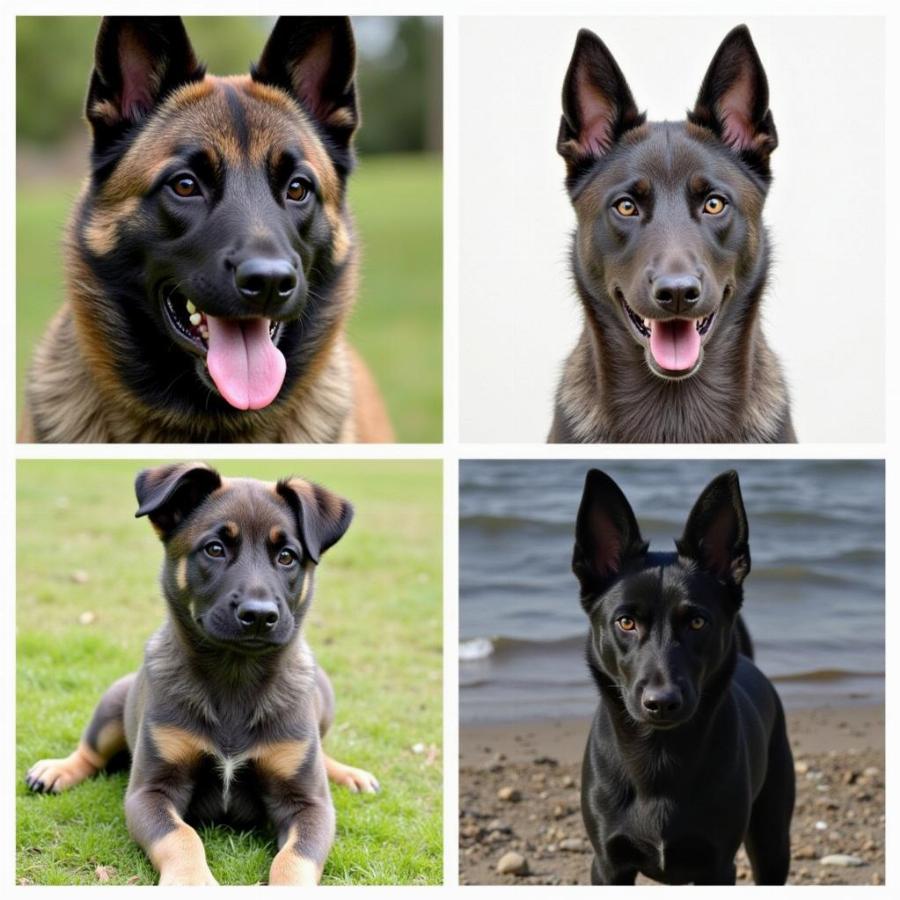Are you searching for a tiny and affectionate companion with a big personality? Look no further than the adorable “tiny small black Norwegian dog.” This search term encompasses several charming breeds originating in Norway, each possessing unique traits and captivating charm. This comprehensive guide will delve into the world of these pint-sized pups, exploring their history, temperament, care requirements, and more.
Unraveling the Mystery: Which Breed Are You Searching For?
The term “tiny small black Norwegian dog” can refer to several Norwegian breeds, including:
- Norwegian Buhund: Known for their striking black coat and playful demeanor, these small-to-medium-sized dogs are intelligent and eager to please.
- Miniature Norwegian Elkhound: A smaller version of their larger counterpart, these alert and loyal dogs boast a distinctive black coat and a sturdy build.
- Black Norwegian Lundehund: This rare breed is recognized for its unique physical characteristics, including six toes on each foot, and their history as skilled Puffin hunters.
 Tiny Black Norwegian Dog Breeds
Tiny Black Norwegian Dog Breeds
While their appearances differ slightly, these breeds share a common heritage and many appealing traits. Understanding the specific breed you’re interested in will help ensure you find the perfect canine companion.
Temperament and Personality: What to Expect
Tiny small black Norwegian dogs are renowned for their intelligence, loyalty, and affectionate personalities. They typically thrive in active households and enjoy participating in activities such as:
- Agility training: These agile and quick-witted dogs excel in agility courses.
- Hiking and outdoor adventures: Their sturdy build and adventurous spirit make them ideal hiking companions.
- Family playtime: These dogs are playful and bond closely with their families, making them wonderful additions to homes with children.
Early socialization and consistent training are essential to raise a well-adjusted and happy Norwegian pup.
Caring for Your Tiny Companion: Nutrition, Grooming, and Exercise
Nutrition: Providing a balanced diet tailored to your dog’s age, activity level, and breed is crucial for maintaining optimal health. Consult your veterinarian for feeding recommendations specific to your tiny Norwegian dog.
Grooming: These breeds typically have double coats that require regular brushing to prevent matting and manage shedding. Bathing should be done as needed, using a gentle dog shampoo.
Exercise: Despite their small size, these energetic dogs require daily exercise to stay happy and healthy. Aim for at least 30 minutes of physical activity per day, which can include walks, playtime, or engaging in dog sports.
Health Considerations: Ensuring a Long and Happy Life
Like all breeds, tiny small black Norwegian dogs may be prone to certain health conditions, such as:
- Eye conditions: Regular eye check-ups are important to detect and address any potential issues early on.
- Hip dysplasia: Responsible breeders screen their dogs for hip dysplasia to minimize the risk.
- Patellar luxation: This condition affects the kneecap and can cause lameness.
By staying informed about potential health concerns and providing routine veterinary care, you can help your beloved companion live a long and healthy life.
Finding a Reputable Breeder
If you’ve set your heart on welcoming a tiny small black Norwegian dog into your family, finding a reputable breeder is essential. Look for breeders who prioritize the health and well-being of their dogs, and who are knowledgeable about the breed’s specific needs.
“Choosing the right breeder can make all the difference in ensuring a healthy and happy start for your new furry family member,” says renowned veterinarian Dr. Emily Carter. “Don’t hesitate to ask questions and gather as much information as possible before making a decision.”
Conclusion: Embracing the Joys of a Tiny Norwegian Dog
Owning a tiny small black Norwegian dog is a rewarding experience. Their playful nature, unwavering loyalty, and charming personalities bring immense joy to families of all sizes. By understanding their unique needs and providing proper care, you can create a loving and fulfilling life for your pint-sized Norwegian companion.
Frequently Asked Questions:
1. Are tiny small black Norwegian dogs good with children?
Yes, they generally are good with children, especially when properly socialized and trained from a young age. However, supervision is always recommended.
2. Do these breeds bark a lot?
While they are alert dogs and may bark to signal visitors, they are not known for excessive barking.
3. Are they suitable for apartment living?
Their small size makes them adaptable to apartment living, but they still require daily exercise and mental stimulation.
4. What is the average lifespan of a tiny small black Norwegian dog?
The average lifespan varies depending on the specific breed, but most live for 12-15 years.
5. Are they easy to train?
Their intelligence and eagerness to please make them relatively easy to train, but consistency and positive reinforcement are key.
Explore More About Norwegian Dog Breeds:
- Norwegian Elkhound: A Comprehensive Guide
- Black Norwegian Lundehund: Unveiling the Mysteries of this Rare Breed
Beaut Dogs: Your Trusted Source for Canine Information
Beaut Dogs is your one-stop resource for all things dog-related. We provide comprehensive and reliable information on various dog breeds, care tips, training advice, and much more. For personalized guidance and support, reach out to our team at [email protected]. We’re always happy to help you navigate the wonderful world of dog ownership!